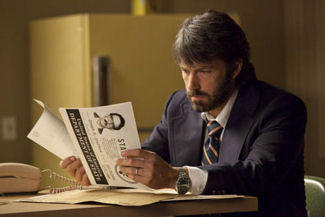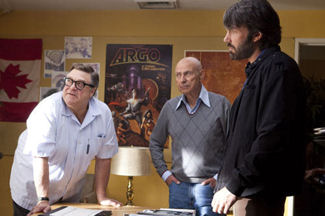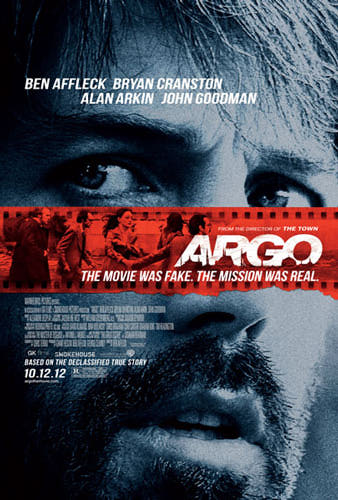Director Affleck blurs the line from the beginning, explaining the events that led up to the Iranian hostage crisis in storyboards form. From there he segues into real news footage, which starts blending with scenes recreating the tense day when angry Iranians stormed the American embassy.
In casting, he makes sure that most of his actors (while all actually good) closely resemble the actual people they portrayed. Actually, the only major character who doesn't look like the real person is protagonist Tony Mendez, a determinedly average looking man given movie star glamour by Affleck himself. But that, too, seems only in line with the motif Affleck works smoothly in Argo.
It's all being done for the cameras, you see. At one point, CIA extraction man Mendez takes the advice of his Hollywood connection John Chambers (John Goodman) and stages a reading of the near-incomprehensible space opera "Argo." It's to make the hoax look good and feel real, a glitzy party at the top of an exclusive Hollywood hotel.
 But as the cast – who do not know there is no actual production planned – perform the script, Affleck intercuts with Iranian women reading statements about the wrongdoing of their American hostages, a chilling juxtaposition that points out how much real life had become just image. And this is thirty years ago, before shows like Jersey Shore.
But as the cast – who do not know there is no actual production planned – perform the script, Affleck intercuts with Iranian women reading statements about the wrongdoing of their American hostages, a chilling juxtaposition that points out how much real life had become just image. And this is thirty years ago, before shows like Jersey Shore.
Yet it is a simpler time, when a father going through a painful separation can bond with his son by watching the same show on television, though they're in different cities. As father and son watch Battle for the Planet of the Apes, Mendez gets the idea to fake a science fiction film in order to extract the diplomats now hiding in the Canadian Ambassador's home.
The older generation of CIA officials – perhaps more used to westerns than Star Wars -- doesn't get it. But Supervisor Jack O'Donnell (Bryan Cranston) agrees to go along with the risk. It's the best of a series of bad ideas to fix a bad situation.
Affleck handles the material with skill. He's a director who effectively dances between entertainment and making a point. His pacing works well to create a taut thriller, but his artist's eye keeps reaching for something more, at which he often succeeds.
 Admittedly, at times the suspense feels over-revved, the forces conspiring against the Diplomats too much like Hollywood touches. Considering how high the stakes are, however, it's possible that the real situation was even more tense. We've just been inured to obstacles as being heavy-handed plot points.
Admittedly, at times the suspense feels over-revved, the forces conspiring against the Diplomats too much like Hollywood touches. Considering how high the stakes are, however, it's possible that the real situation was even more tense. We've just been inured to obstacles as being heavy-handed plot points.
For a guy who has knocked around some pretty overblown movies, Affleck also knows how to keep actors under-playing. The only two who get to be outsized are Goodman and Alan Arkin as the film director brought in for verisimilitude. It's forgivable; they are holding their own in Hollywood, after all.
The rest of the cast tends to underplay, and Affleck wisely keeps that tone himself. Many of his scenes bounce off of Cranston, an actor of consummate ease long overdue for his new success. Though Cranston is certainly capable of blowing through the roof, he keeps things grounded, and that energy reflects off of Affleck. As a director, he even gets comic actor Tate Donovan to tone things down.
Affleck co-produced Argo with George Clooney, and that's a formidable team indeed. Both are artists who have settled down into men of great taste in projects. Nowadays, even their failures are at least interesting, because they truly struggle to make work that lasts.
It is, after all, all for the cameras.
Check out a little of the actual history here...

 But as the cast – who do not know there is no actual production planned – perform the script, Affleck intercuts with Iranian women reading statements about the wrongdoing of their American hostages, a chilling juxtaposition that points out how much real life had become just image. And this is thirty years ago, before shows like Jersey Shore.
But as the cast – who do not know there is no actual production planned – perform the script, Affleck intercuts with Iranian women reading statements about the wrongdoing of their American hostages, a chilling juxtaposition that points out how much real life had become just image. And this is thirty years ago, before shows like Jersey Shore. Admittedly, at times the suspense feels over-revved, the forces conspiring against the Diplomats too much like Hollywood touches. Considering how high the stakes are, however, it's possible that the real situation was even more tense. We've just been inured to obstacles as being heavy-handed plot points.
Admittedly, at times the suspense feels over-revved, the forces conspiring against the Diplomats too much like Hollywood touches. Considering how high the stakes are, however, it's possible that the real situation was even more tense. We've just been inured to obstacles as being heavy-handed plot points.





